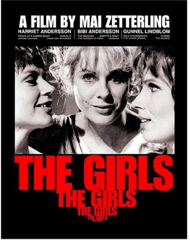| Release List | Reviews | Price Search | Shop | Newsletter | Forum | DVD Giveaways | Blu-Ray/ HD DVD | Advertise |
| Reviews & Columns |
|
Reviews DVD TV on DVD Blu-ray International DVDs Theatrical Reviews by Studio Video Games Features Collector Series DVDs Easter Egg Database Interviews DVD Talk TV DVD Talk Radio Feature Articles Columns Anime Talk DVD Savant HD Talk Horror DVDs Silent DVD
|
DVD Talk Forum |
|
|
| Resources |
|
DVD Price Search Customer Service #'s RCE Info Links |
|
Columns
|
 |
The Girls
|
||||
A common and not always successful gambit for adapting a classic play to film is not to film the play, but instead film a group of modern actors performing the play. The idea is that the universal and relevant aspect of the old work will be reinforced when the actors realize that an ancient drama relates directly to problems in their own lives. Starting with Loving Couples in 1964, Swedish actress Mai Zetterling directed and wrote (often with David Hughes) a series of unusually adult films about modern relationships. Sexually frank but equally mature, her pictures (Night Games, Doktor Glas) received plenty of art-house exposure in the U.S.. The Girls is a contemporary story of actresses dealing with fragmented lives during the tour of a classic Greek play. Zetterling augments her usual insights into character with semi-fantastic digressions, cinematic trickery, and an engaging sense of humor.
Once again I'm intrigued by the contrast between Mai Zetterling's vibrant, extroverted films and Ingmar Bergman's introspective gloom-fests; it's good to be reminded that Scandinavian audiences are no more prone to philosophical self-absorption than film fans in any other region. The Girls is about serious issues but maintains a playful attitude. Although aware of newly articulated feminist thinking, Zetterling's women are neither symbols nor idealized in any way. Just as Lysistrata doesn't presume that the women's sex strike is necessarily justified, The Girls presents us with a trio of emancipated females fully aware that that they're vain and selfish. The director who criticizes his actresses for a lack of commitment behind their protests has a point, as none of them would claim that their personal lives are in order. Marianne, Liz and Gunilla want to be recognized as loving women and as serious professionals knowing full well that they really aren't in control of either role. The Girls is a much lighter show than its theme would suggest. The women are unpredictable both on stage and off. They loudly reject unwelcome male advances in a restaurant bar but are doubly conscious of the need to be attractive. Liz wants to be considered a serious professional yet dotes on being recognized in a store. In one of the more amusing subplots, she tries to interact with her public by more or less inviting a local businessman to invite her home to dinner with his wife. When Liz tries to get into an informal discussion about lives and 'truth' the couple just stares at her, unequipped to open up on such subjects. Liz would reject the idea that she belongs to some artistic elite apart from the common citizen, but she definitely finds that some kind of barrier seems to separate them. The film tries some perhaps Fellini-esque visual devices, many of which succeed. Marianne's childish play in the snow with her married lover is seen in such high contrast that they end up being dark details on a field of white. A light-hearted chase scene interrupts a fashion show at an indoor mall. Liz has complicated dreams (daydreams) of the men in her life getting together in a boy's club to voice their liberation from foolish women. Liz's dreams also rerflect the nagging thought that her theatrical career is based on needy exhibitionism -- she imagines herself stripping before a large audience of men. The refreshing surprise is that none of these episodes come off as pretentious, didactic, precocious or precious. Not a bit of the adult content is exploitative, either. The Anderssons and Lindblom are a delightful trio of nervy, vibrant females -- sexy but not coquettish and sensual without debasing themselves. The Girls ends intriguingly as the partying thespians dissolve into abstract patterns in distorting mirrors, a choice that sounds artificial but works on film, even forty years later. Project X and New Yorker present Mai Zetterling's The Girls in a handsome enhanced B&W transfer. Text filmographies are welcome, but a big draw for the disc is the inclusion of a feature length 1996 film called Lines from the Heart. Two years after their director's death, the three actresses of The Girls reunite at Mai Zetterling's home in the south of France to discuss their lives, acting and their work together. We cannot help but compare the three women and their film images from three decades before; they're an object lesson in aging gracefully.
On a scale of Excellent, Good, Fair, and Poor,
The Girls rates:
Review Staff | About DVD Talk | Newsletter Subscribe | Join DVD Talk Forum |
|
| Release List | Reviews | Price Search | Shop | SUBSCRIBE | Forum | DVD Giveaways | Blu-Ray/ HD DVD | Advertise |






